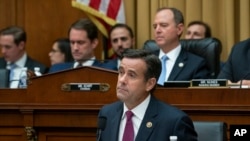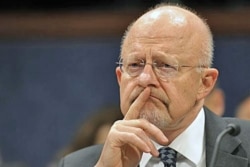Last update: July 30 at 11:28 a.m.
U.S. President Donald Trump's choice for the next director of national intelligence is an ardent supporter of the president who was harshly critical of former special counsel Robert Mueller during his congressional hearing last week.
John Ratcliffe, a third-term congressman from Texas, wrote on Twitter that he was "deeply grateful" to the president for the nomination to replace Dan Coats, adding, "President Trump's call to serve in this role was not one I could ignore."
Ratcliffe was first elected to serve in the House of Representatives in 2014 and holds important posts on the House Intelligence and Judiciary committees. He's backed Trump on everything from Brett Kavanaugh's nomination to the Supreme Court to the president's hardline immigration policies, and has voted to repeal the Affordable Care Act and defund Planned Parenthood.
Since Trump took office, Ratcliffe has voted in alignment with the president nearly 92% of the time, according to a FiveThirtyEight analysis. His district is the seventh-most Republican one in the U.S., according to the Cook Partisan Voting Index, and went for Trump by 75% in the 2016 election.
Ratcliffe’s new fame has brought scrutiny to his credentials.
After a stint as Heath, Texas mayor, Ratcliffe worked as a U.S. attorney and federal terrorism prosecutor. While at the U.S. Justice Department, his office was involved in numerous successful immigration raids in Texas, and in a case against a nonprofit funneling money to terrorist group Hamas.
Ratcliffe has often highlighted that case, U.S. vs. Holy Land Foundation, as a credential, but he actually misrepresented his role in it, ABC reported Tuesday.
Though past press releases and his own official website say Ratcliffe served as a special prosecutor in the case and convicted the those found guilty, he doesn’t appear in court records, and the attorneys and officials involved didn’t recall him, according to ABC. Ratcliffe’s office said that he actually investigated issues behind the first trial in the case.
Headlining at the Mueller hearing
Ratcliffe made headlines last week, when he lambasted former special counsel Robert Mueller during a House hearing on his Russia probe, excoriating Mueller for refusing to exonerate Trump completely from charges of obstruction of justice.
“You wrote 180 pages, 180 pages about decisions that weren’t reached, about potential crimes that weren’t charged or decided,” he told Mueller at a hearing. “And respectfully, respectfully, by doing that you managed to violate every principle in the most sacred of traditions about prosecutors not offering extra-prosecutorial analysis about potential crimes that aren’t charged.”
Ratcliffe went on to allege that the second half of Mueller's report on his investigation wasn’t “authorized under law to be written.” His words brought his name near the forefront of the hearing.
Side by side with his predecessors
Critics say that Ratcliffe has markedly less intelligence experience than his predecessors. Since the position was established in 2004, the directors have typically had decades of experience in the military or foreign service and had prior roles in the intelligence community.
James R. Clapper, an Obama pick, had previously directed two different U.S. intelligence agencies prior to his unanimous Senate confirmation in 2010. James McConnell, a Bush nomination, had already headed the National Security Agency, while John Negroponte, the first director, had 15 years as an ambassador and two as deputy National Security Adviser under his belt.
Even Dan Coats, the outgoing director, had two years in the military, eight on the Senate Intelligence Committee, and four as an ambassador.
If confirmed as director, Ratcliffe would oversee the 17 intelligence agencies that make up the National Intelligence Program, and advise Trump and two agencies under the executive branch. Directors of National Intelligence do not have authority to issue orders, instead coordinating the country's intelligence apparatus.
The Senate Intelligence Committee will process Ratcliffe's nomination normally when it's received, rather than expedite it, said Chairman Richard Burr in a statement Monday.
Coats, the previous director, resigned Sunday, effective August 15. In his two years on the job, Coats had publicly broken with the president on issues ranging from North Korea, Iran and Syria.










